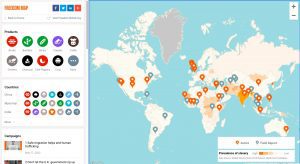Human trafficking, trafficking in persons, and modern-day slavery are umbrella terms – often used interchangeably – that refer to the exploitation of individuals through threat or use of force, coercion, abduction, fraud, and/or deception. These terms also include the practices of forced labor, debt bondage, domestic servitude, forced marriage, sex trafficking, child sex trafficking, and the recruitment and use of child soldiers, among others.
For a precise definition of the term “trafficking in persons,” please see article 3 of the Protocol to Prevent, Suppress and Punish Trafficking in Persons, Especially Women and Children, supplementing the United Nations Convention against Transnational Organized Crime (also known as the Palermo Protocol or the UN TIP Protocol).
Human trafficking is often broken into two broad categories – sex trafficking and labor trafficking. In reality, sex trafficking is also a form of forced labor and labor trafficking, however they are often treated and discussed as distinct from each other. A detailed typology of trafficking in persons, detailing twenty-five different categories, was developed by Polaris in 2017 and can be found here.
Freedom United has developed an interactive map to help supporters identify the most prevalent forms of trafficking in different regions and connect with campaigns to help address them. Click on the image below to use the map on Freedom United’s website.


